高中英语语法二轮复习 被动语态详解课件(40张PPT)
文档属性
| 名称 | 高中英语语法二轮复习 被动语态详解课件(40张PPT) |  | |
| 格式 | zip | ||
| 文件大小 | 993.5KB | ||
| 资源类型 | 教案 | ||
| 版本资源 | 通用版 | ||
| 科目 | 英语 | ||
| 更新时间 | 2019-03-04 09:52:27 | ||
图片预览


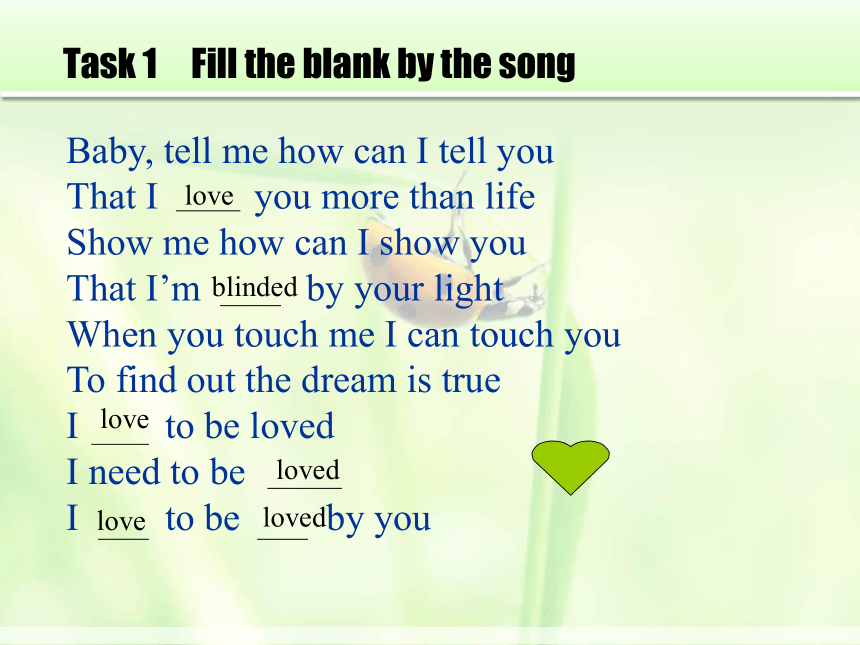
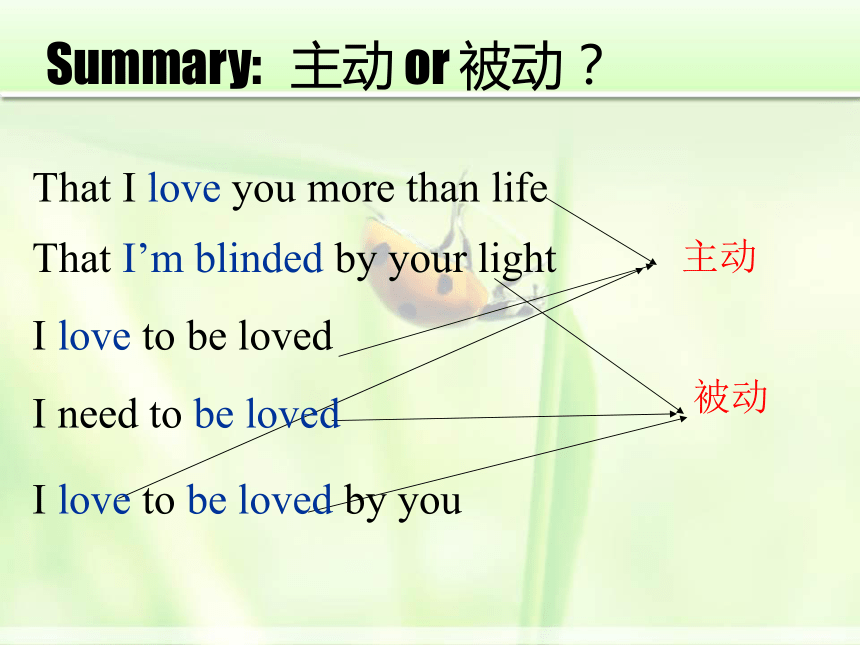
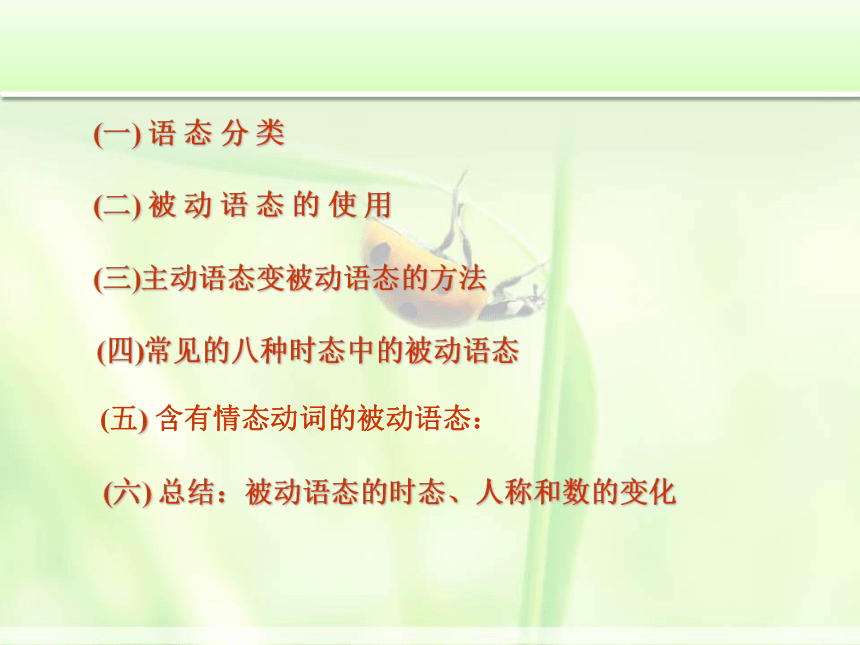

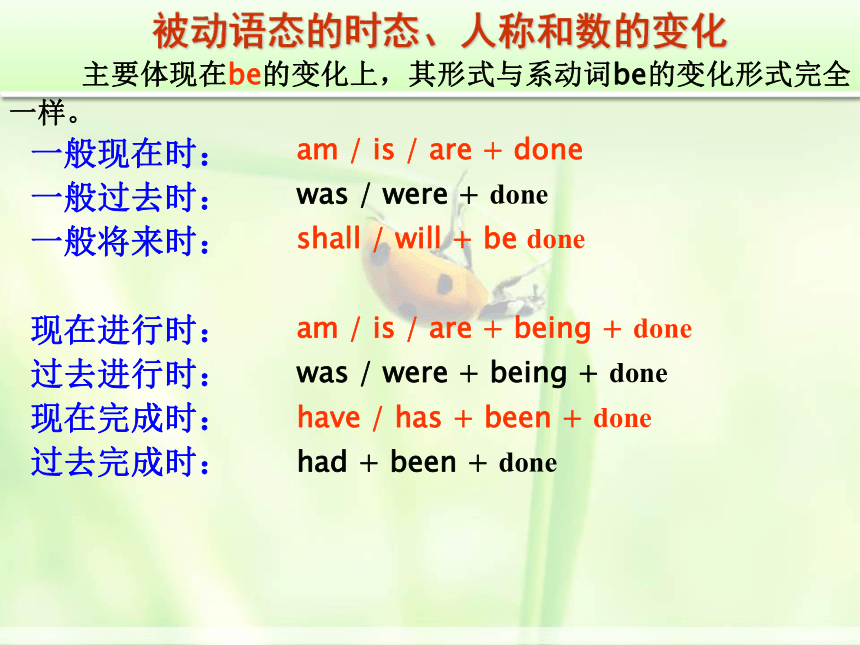

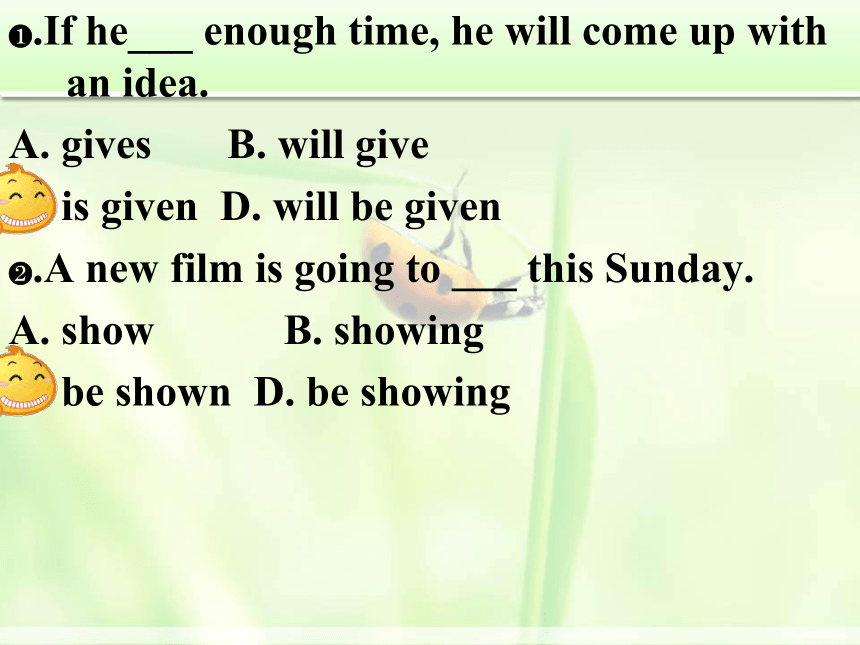
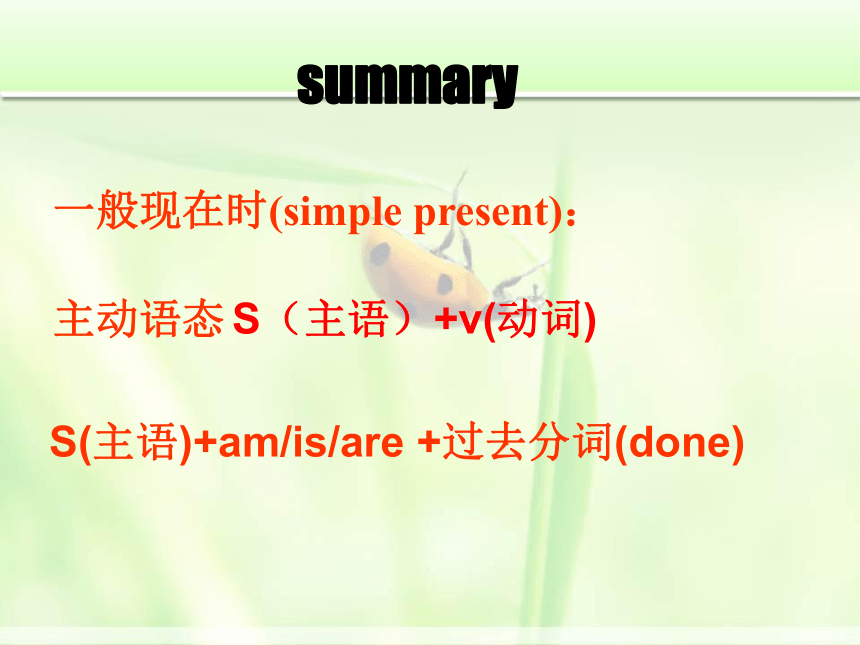

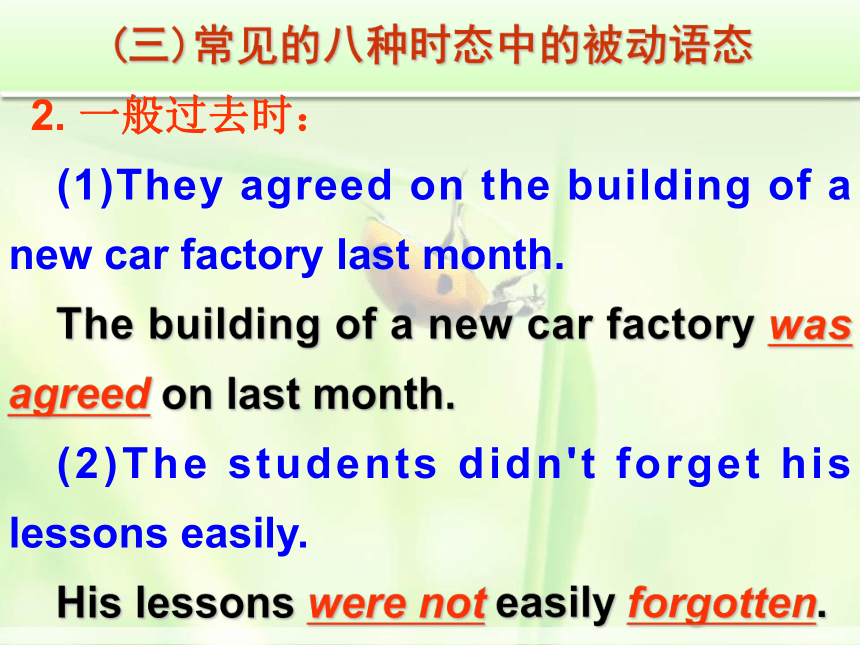
文档简介
被动语态
Warming up
Love To Be Loved By You 是一首旋律优美的英文歌曲,演唱者是美国流行歌手马克·特伦茨(Marc Terenzi)。2005年,Marc与德国歌手莎拉·寇娜(Sarah Connor)结婚时,将这首歌作为爱的礼物献给妻子。
Task 1 Fill the blank by the song
Baby, tell me how can I tell you That I you more than life Show me how can I show you That I’m by your light When you touch me I can touch you To find out the dream is true I to be loved I need to be I to be by you
love
blinded
love
loved
love
loved
Summary: 主动 or 被动?
主动
被动
That I love you more than life
That I’m blinded by your light
I love to be loved
I need to be loved
I love to be loved by you
(一) 语 态 分 类
(六) 总结:被动语态的时态、人称和数的变化
(四)常见的八种时态中的被动语态
(五) 含有情态动词的被动语态:
(二) 被 动 语 态 的 使 用
(三)主动语态变被动语态的方法
(一) 语 态 分 类
英语动词有两种语态,主动语态和被动语态。主动语态表示主语是动作的执行者,被动语态表示主语是动作的承受者。如:
They will build a new bridge over the river. (主动)
A new bridge will be built over the river. (被动)
汉语中常用“被”、“给”、“由”、“受”等词用来表示被动,而英语用:
be + 及物动词的过去分词构成。
被动语态的时态、人称和数的变化
主要体现在be的变化上,其形式与系动词be的变化形式完全一样。
一般现在时:
一般过去时:
一般将来时:
现在进行时:
过去进行时:
现在完成时:
过去完成时:
?
am / is / are + done
was / were + done
shall / will + be done
am / is / are + being + done
was / were + being + done
have / has + been + done
had + been + done
常见的八种时态中的被动语态
1. 一般现在时:
(1)People grow rice in the south of the country.
Rice is grown in the south of the country.
(2)The school doesn't allow us to enter the chemistry lab without a teacher.
We are not allowed to enter the chemistry lab without a teacher.
?.If he___ enough time, he will come up with an idea.
A. gives B. will give
C. is given D. will be given
?.A new film is going to ___ this Sunday.
A. show B. showing
C. be shown D. be showing
summary
主动语态 S(主语)+v(动词)
S(主语)+am/is/are +过去分词(done)
一般现在时(simple present):
Task 3 Group Work
1 一般过去时:
一般将来时:
情态动词:
S+was/were +done
S+ will+be+ done
S+can/may/must/shoud
+ be+ done
(三)常见的八种时态中的被动语态
2. 一般过去时:
(1)They agreed on the building of a new car factory last month.
The building of a new car factory was agreed on last month.
(2)The students didn't forget his lessons easily.
His lessons were not easily forgotten.
(三)常见的八种时态中的被动语态
3. 一般将来时:
(1)They will send cars abroad by sea.
Cars will be sent abroad by sea.
(2)They will give plenty of jobs to school-leavers.
Plenty of jobs will be given to school-leavers.
?. I promise that the matter will______. (NMET)
A.be taden care
B.be taken care of
C.take care
D.take care of
析:take care of…是固定短语,若无of则不可带宾语,只能跟that从句。所以此题答案为B。
(三)常见的八种时态中的被动语态
4. 过去将来时:
(1)The manager said they would complete the project by the end of the year.
The manager said the project would be completed by the end of the year.
(2) The workers told me they would mend the car as soon as possible.
The workers told me that the car would be mended as soon as possible.
(三)常见的八种时态中的被动语态
5. 现在进行时:
(1)The radio is broadcasting English lessons.
English lessons are being broadcasted on the radio.
(2) We are painting the rooms.
The rooms are being painted.
?. —Have you got the result of the last examination? —Not yet. We’ve been told that the papers ________. A. are marked
B. are being marked C. have been marked
D. were marked
此题答案应为B。
?.We can’t use the bridge now, because it ____.
A. has been repaired
B. is repairing
C. is repaired
D. is being repaired
(三)常见的八种时态中的被动语态
6. 过去进行时:
(1)The workers were mending the road.
The road was being mended.
(2)This time last year we were planting trees here.
Trees were being planted here this time last year.
(三)常见的八种时态中的被动语态
7. 现在完成时:
(1)Someone has told me the sports meeting might be put off.
I have been told the sports meeting might be put off.
(2)He has brought his book here.
His book has been brought here.
(三)常见的八种时态中的被动语态
8. 过去完成时:
(1)When I got to the theatre, I found they had already sold out the tickets.
When I got to the theatre, I found the tickets had already been sold out.
(2) The whole country was very sad at the news of his death; People had considered him to be a great leader.
He had been considered to be a great leader.
A lot of new roads ___ built in the west of China.
A. must B. must be
C. has D. have
?.His car ___ tomorrow.
A. will be repaired
B. is repaired
C. is being repaired
D. has been repaired
(四) 含有情态动词的被动语态:
含有情态动词的被动语态是由“情态动词+ be+ 及物动词的过去分词”构成。
(1)You must hand in your compositions after class.
Your compositions must be handed in after class.
(2)He can write a great many letters with the computer.
A great many letters can be written with the computer by him.
Ask and answer
water
every day
at home
my grandma
A: When are the flowers watered?
B: The flowers are watered every day.
A: Where are the flowers watered?
B: The flowers are watered at home.
A: Who are the flowers watered by?
B: The flowers are watered by my grandma.
A: Are the flowers watered by my grandma at home every day? B: yes, they are.
A: When are the flowers watered?
B: The flowers are watered every day.
A: Where are the flowers watered?
B: The flowers are watered at home.
A: Who are the flowers watered by?
B: The flowers are watered by my grandma.
A: When are the flowers watered?
B: The flowers are watered every day.
A: Where are the flowers watered?
B: The flowers are watered at home.
A: Are the flowers watered by my grandma at home every day? B: yes, they are.
A: Who are the flowers watered by?
B: The flowers are watered by my grandma.
A: When are the flowers watered?
B: The flowers are watered every day.
A: Where are the flowers watered?
B: The flowers are watered at home.
When
Where
Who
sweep
on weekends
in the kitchen
my mother
When where who
(五)主动语态变被动语态的方法
I bought a computer last term.
A computer was bought (by me) last term.
宾(受动者)
主
谓
A computer was bought (by me) last term.
Task 4
2.谓语动词的主动形式表示被动意义:
1.英语中有很多动词如 break,catch,clean,drive,lock,open,
sell,read,write,wash等,当它们被用作不及物动词来描述主语特征时,
常用其主动形式 表达被动意义,主语通常是物。
例 This kind of cloth washes well.
注意:主动语态表被动强调的是主语的特征,而被动语态则强调外界作用造成的影响。
翻译句子:
1. 这件外套容易干。
2. 尼龙(Nylon)容易清洗干净。
3. 这项计划进展地很好。
This coat dries easily.
Nylon cleans easily.
The plan works out wonderfully.
2. 表示“发生、进行”的不及物动词和短语,如:begin,finish, start,
open, close, happen, last, take place, break out, come out, come
about, come true, run out, give out, turn out(不能用于被动语态)等
以主动形式表示被动意义。
例 How do the newspapers come out?
China is a developing country, (belong) to the Third
World.
belonging
1. The shop (close) at 6 p.m. every day.
2. Work (begin) at 7o'clock this morning.
3. Our dreams finally (come) true.
closes
began
will come
3. 非谓语动词的主动形式表被动意义
在某些句型中可用动名词和不定式的主动形式表被动意义
1.在need,want,require, bear,deserve等词的后面,动名词用主动形式
表示被动意义,其含义相当于动词不定式的被动形式。
2.形容词worth后面跟动名词的主动形式表示被动含义,但不能跟动词不定式;而worthy后面跟动词不定式的被动形式。
The house needs repairing(to be repaired)..
翻译句子:这所房子需要被修理。
翻译句子:这本画书很值得读。
The picture-book is well worth reading..
be worthy of being read..
be worthy to be read
语态转换时所注意的问题
1. 把主动语态变为被动语态时,其谓语动词的时态要与原句时态保持一致,其谓语动词的数要与新主语保持一致。
We have bought a new computer.
A new computer has been bought. (正确)
A new computer have been bought. (错误)
2. 含有双宾语的主动句变被动句时,可分别将其中的一个宾语变为主语,另一个不动,一般变间接宾语为主语时比较多。
My uncle gave me a present on my birthday.
I was given a present on my birthday.
如果把直接宾语(指物)改为主语,则在间接宾语(指人)前加适当的介词,如上句还可以说:
A present was given to me yesterday.
保留宾语
×
注意:1.一般在下列动词后,常在间接宾语前用介词 to,如:
bring, give, hand, lend, offer, pass, pay, promise, sell, show, take, teach, tell 等。
(1) The book was showed to the class.
(2) My bike was lent to her.
2.一般在下列动词后,间接宾语前用介词 for, 如:
build, buy, cook, cut, choose, do, fetch, find, fix, get, keep, make, order, paint, play, sing 等。
(1) A new skirt was made for me.
(2) The meat was cooked for us.
(3) Some country music was played for us.
3. 当主动句的主语是nobody, no one等含有否定意义的不定代词时,被动句中将其变为anybody, 作by的宾语,并将谓语动词变为否定的被动语态。如:
Nobody can answer this question.
误:The question can be answered by nobody.
正:The question can not be answered by anybody.
×
6. 并不是所有动词都有被动语态
1) happen, take place, break out, belong to, cost, last等不及物动词或词组无被动语态。如:
[误] Great changes have been taken
place in China since 1978.
[正] Great changes have taken place in
China since 1978.
2) open, break, drop等不强调动作发出者时常用主动语态。如:
[误] The door has been opened of itself.
[正] The door has opened of itself.
8. 短语动词不可分割或省略其中的介词
或副词。如:
The SARS patients have been taken
good care of.
9. 一些特殊动词, 如borrow, finish, begin,
buy, start, return, marry, open, join等
构成的现在完成时的被动语态不能与
表示一段时间的状语连用。若要表达
相应的意思,则需改换动词或时态。
如:
My brother has had (不能用has bought)
this bike for almost four years.
How long has this book been bought?
How long ago was this book bought?
Lead-in
1. Visitors____________(request) not to touch the exhibits(展览品).
2. I __________(give) ten minutes to read the book last weekend.
3. All the preparations for the task_______________(complete), and we're
ready to start.
4. By the end of last year, another new gymnasium_________________
(complete) in Beijing.
5. A new cinema___________(build) here now.
6. A meeting______________(hold) when I was there.
7. Hundreds of jobs______________ (lose)if the factory closes.
are requested
was given
have been completed
had been completed
is being built
was being held
will be lost
10. 在汉语中,有一类句子不出现主语,在英语中一般可用被动结构来表示,例如:
据说…… It is said that …
据报导…… It is reported that …
据推测…… It is supposed that …
希望…… It is hoped that …
众所周知…… It is well known that …
普遍认为…… It is generally considered that …
有人建议…… It is suggested that …
1) It is reported that it is going to rain tomorrow.
2) It is well known that Thomas Edison invented the electric lamp.
*
1. It is the first time that I have listened to her sing.
2. Tomorrow is Christmas.
3. John`s hair is falling out recently.
4. These foreigners visited Guangzhou last spring.
5. he has worked here for 20 years.
*
6. Have you been to the Moon?
7. He changed his mind last Friday.
8. He has changed his mind since last Friday.
9. My chothes are wet while I am walking in the rain all the time.
10. They had prepared everything before I came.
Warming up
Love To Be Loved By You 是一首旋律优美的英文歌曲,演唱者是美国流行歌手马克·特伦茨(Marc Terenzi)。2005年,Marc与德国歌手莎拉·寇娜(Sarah Connor)结婚时,将这首歌作为爱的礼物献给妻子。
Task 1 Fill the blank by the song
Baby, tell me how can I tell you That I you more than life Show me how can I show you That I’m by your light When you touch me I can touch you To find out the dream is true I to be loved I need to be I to be by you
love
blinded
love
loved
love
loved
Summary: 主动 or 被动?
主动
被动
That I love you more than life
That I’m blinded by your light
I love to be loved
I need to be loved
I love to be loved by you
(一) 语 态 分 类
(六) 总结:被动语态的时态、人称和数的变化
(四)常见的八种时态中的被动语态
(五) 含有情态动词的被动语态:
(二) 被 动 语 态 的 使 用
(三)主动语态变被动语态的方法
(一) 语 态 分 类
英语动词有两种语态,主动语态和被动语态。主动语态表示主语是动作的执行者,被动语态表示主语是动作的承受者。如:
They will build a new bridge over the river. (主动)
A new bridge will be built over the river. (被动)
汉语中常用“被”、“给”、“由”、“受”等词用来表示被动,而英语用:
be + 及物动词的过去分词构成。
被动语态的时态、人称和数的变化
主要体现在be的变化上,其形式与系动词be的变化形式完全一样。
一般现在时:
一般过去时:
一般将来时:
现在进行时:
过去进行时:
现在完成时:
过去完成时:
?
am / is / are + done
was / were + done
shall / will + be done
am / is / are + being + done
was / were + being + done
have / has + been + done
had + been + done
常见的八种时态中的被动语态
1. 一般现在时:
(1)People grow rice in the south of the country.
Rice is grown in the south of the country.
(2)The school doesn't allow us to enter the chemistry lab without a teacher.
We are not allowed to enter the chemistry lab without a teacher.
?.If he___ enough time, he will come up with an idea.
A. gives B. will give
C. is given D. will be given
?.A new film is going to ___ this Sunday.
A. show B. showing
C. be shown D. be showing
summary
主动语态 S(主语)+v(动词)
S(主语)+am/is/are +过去分词(done)
一般现在时(simple present):
Task 3 Group Work
1 一般过去时:
一般将来时:
情态动词:
S+was/were +done
S+ will+be+ done
S+can/may/must/shoud
+ be+ done
(三)常见的八种时态中的被动语态
2. 一般过去时:
(1)They agreed on the building of a new car factory last month.
The building of a new car factory was agreed on last month.
(2)The students didn't forget his lessons easily.
His lessons were not easily forgotten.
(三)常见的八种时态中的被动语态
3. 一般将来时:
(1)They will send cars abroad by sea.
Cars will be sent abroad by sea.
(2)They will give plenty of jobs to school-leavers.
Plenty of jobs will be given to school-leavers.
?. I promise that the matter will______. (NMET)
A.be taden care
B.be taken care of
C.take care
D.take care of
析:take care of…是固定短语,若无of则不可带宾语,只能跟that从句。所以此题答案为B。
(三)常见的八种时态中的被动语态
4. 过去将来时:
(1)The manager said they would complete the project by the end of the year.
The manager said the project would be completed by the end of the year.
(2) The workers told me they would mend the car as soon as possible.
The workers told me that the car would be mended as soon as possible.
(三)常见的八种时态中的被动语态
5. 现在进行时:
(1)The radio is broadcasting English lessons.
English lessons are being broadcasted on the radio.
(2) We are painting the rooms.
The rooms are being painted.
?. —Have you got the result of the last examination? —Not yet. We’ve been told that the papers ________. A. are marked
B. are being marked C. have been marked
D. were marked
此题答案应为B。
?.We can’t use the bridge now, because it ____.
A. has been repaired
B. is repairing
C. is repaired
D. is being repaired
(三)常见的八种时态中的被动语态
6. 过去进行时:
(1)The workers were mending the road.
The road was being mended.
(2)This time last year we were planting trees here.
Trees were being planted here this time last year.
(三)常见的八种时态中的被动语态
7. 现在完成时:
(1)Someone has told me the sports meeting might be put off.
I have been told the sports meeting might be put off.
(2)He has brought his book here.
His book has been brought here.
(三)常见的八种时态中的被动语态
8. 过去完成时:
(1)When I got to the theatre, I found they had already sold out the tickets.
When I got to the theatre, I found the tickets had already been sold out.
(2) The whole country was very sad at the news of his death; People had considered him to be a great leader.
He had been considered to be a great leader.
A lot of new roads ___ built in the west of China.
A. must B. must be
C. has D. have
?.His car ___ tomorrow.
A. will be repaired
B. is repaired
C. is being repaired
D. has been repaired
(四) 含有情态动词的被动语态:
含有情态动词的被动语态是由“情态动词+ be+ 及物动词的过去分词”构成。
(1)You must hand in your compositions after class.
Your compositions must be handed in after class.
(2)He can write a great many letters with the computer.
A great many letters can be written with the computer by him.
Ask and answer
water
every day
at home
my grandma
A: When are the flowers watered?
B: The flowers are watered every day.
A: Where are the flowers watered?
B: The flowers are watered at home.
A: Who are the flowers watered by?
B: The flowers are watered by my grandma.
A: Are the flowers watered by my grandma at home every day? B: yes, they are.
A: When are the flowers watered?
B: The flowers are watered every day.
A: Where are the flowers watered?
B: The flowers are watered at home.
A: Who are the flowers watered by?
B: The flowers are watered by my grandma.
A: When are the flowers watered?
B: The flowers are watered every day.
A: Where are the flowers watered?
B: The flowers are watered at home.
A: Are the flowers watered by my grandma at home every day? B: yes, they are.
A: Who are the flowers watered by?
B: The flowers are watered by my grandma.
A: When are the flowers watered?
B: The flowers are watered every day.
A: Where are the flowers watered?
B: The flowers are watered at home.
When
Where
Who
sweep
on weekends
in the kitchen
my mother
When where who
(五)主动语态变被动语态的方法
I bought a computer last term.
A computer was bought (by me) last term.
宾(受动者)
主
谓
A computer was bought (by me) last term.
Task 4
2.谓语动词的主动形式表示被动意义:
1.英语中有很多动词如 break,catch,clean,drive,lock,open,
sell,read,write,wash等,当它们被用作不及物动词来描述主语特征时,
常用其主动形式 表达被动意义,主语通常是物。
例 This kind of cloth washes well.
注意:主动语态表被动强调的是主语的特征,而被动语态则强调外界作用造成的影响。
翻译句子:
1. 这件外套容易干。
2. 尼龙(Nylon)容易清洗干净。
3. 这项计划进展地很好。
This coat dries easily.
Nylon cleans easily.
The plan works out wonderfully.
2. 表示“发生、进行”的不及物动词和短语,如:begin,finish, start,
open, close, happen, last, take place, break out, come out, come
about, come true, run out, give out, turn out(不能用于被动语态)等
以主动形式表示被动意义。
例 How do the newspapers come out?
China is a developing country, (belong) to the Third
World.
belonging
1. The shop (close) at 6 p.m. every day.
2. Work (begin) at 7o'clock this morning.
3. Our dreams finally (come) true.
closes
began
will come
3. 非谓语动词的主动形式表被动意义
在某些句型中可用动名词和不定式的主动形式表被动意义
1.在need,want,require, bear,deserve等词的后面,动名词用主动形式
表示被动意义,其含义相当于动词不定式的被动形式。
2.形容词worth后面跟动名词的主动形式表示被动含义,但不能跟动词不定式;而worthy后面跟动词不定式的被动形式。
The house needs repairing(to be repaired)..
翻译句子:这所房子需要被修理。
翻译句子:这本画书很值得读。
The picture-book is well worth reading..
be worthy of being read..
be worthy to be read
语态转换时所注意的问题
1. 把主动语态变为被动语态时,其谓语动词的时态要与原句时态保持一致,其谓语动词的数要与新主语保持一致。
We have bought a new computer.
A new computer has been bought. (正确)
A new computer have been bought. (错误)
2. 含有双宾语的主动句变被动句时,可分别将其中的一个宾语变为主语,另一个不动,一般变间接宾语为主语时比较多。
My uncle gave me a present on my birthday.
I was given a present on my birthday.
如果把直接宾语(指物)改为主语,则在间接宾语(指人)前加适当的介词,如上句还可以说:
A present was given to me yesterday.
保留宾语
×
注意:1.一般在下列动词后,常在间接宾语前用介词 to,如:
bring, give, hand, lend, offer, pass, pay, promise, sell, show, take, teach, tell 等。
(1) The book was showed to the class.
(2) My bike was lent to her.
2.一般在下列动词后,间接宾语前用介词 for, 如:
build, buy, cook, cut, choose, do, fetch, find, fix, get, keep, make, order, paint, play, sing 等。
(1) A new skirt was made for me.
(2) The meat was cooked for us.
(3) Some country music was played for us.
3. 当主动句的主语是nobody, no one等含有否定意义的不定代词时,被动句中将其变为anybody, 作by的宾语,并将谓语动词变为否定的被动语态。如:
Nobody can answer this question.
误:The question can be answered by nobody.
正:The question can not be answered by anybody.
×
6. 并不是所有动词都有被动语态
1) happen, take place, break out, belong to, cost, last等不及物动词或词组无被动语态。如:
[误] Great changes have been taken
place in China since 1978.
[正] Great changes have taken place in
China since 1978.
2) open, break, drop等不强调动作发出者时常用主动语态。如:
[误] The door has been opened of itself.
[正] The door has opened of itself.
8. 短语动词不可分割或省略其中的介词
或副词。如:
The SARS patients have been taken
good care of.
9. 一些特殊动词, 如borrow, finish, begin,
buy, start, return, marry, open, join等
构成的现在完成时的被动语态不能与
表示一段时间的状语连用。若要表达
相应的意思,则需改换动词或时态。
如:
My brother has had (不能用has bought)
this bike for almost four years.
How long has this book been bought?
How long ago was this book bought?
Lead-in
1. Visitors____________(request) not to touch the exhibits(展览品).
2. I __________(give) ten minutes to read the book last weekend.
3. All the preparations for the task_______________(complete), and we're
ready to start.
4. By the end of last year, another new gymnasium_________________
(complete) in Beijing.
5. A new cinema___________(build) here now.
6. A meeting______________(hold) when I was there.
7. Hundreds of jobs______________ (lose)if the factory closes.
are requested
was given
have been completed
had been completed
is being built
was being held
will be lost
10. 在汉语中,有一类句子不出现主语,在英语中一般可用被动结构来表示,例如:
据说…… It is said that …
据报导…… It is reported that …
据推测…… It is supposed that …
希望…… It is hoped that …
众所周知…… It is well known that …
普遍认为…… It is generally considered that …
有人建议…… It is suggested that …
1) It is reported that it is going to rain tomorrow.
2) It is well known that Thomas Edison invented the electric lamp.
*
1. It is the first time that I have listened to her sing.
2. Tomorrow is Christmas.
3. John`s hair is falling out recently.
4. These foreigners visited Guangzhou last spring.
5. he has worked here for 20 years.
*
6. Have you been to the Moon?
7. He changed his mind last Friday.
8. He has changed his mind since last Friday.
9. My chothes are wet while I am walking in the rain all the time.
10. They had prepared everything before I came.
